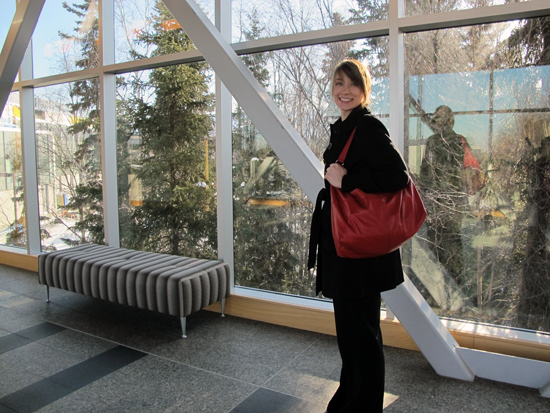Most of us want to be healthier. But motivating to do anything about can be difficult. Now a new kind of health professional could help. They’re called health coaches. In Anchorage, Providence Hospital thinks it’s a model that could help transform the health care system in the years ahead. And for the last few years, they’ve been testing the idea with employees.
Every morning, Shannon Orley parks as far away as possible from her office.
And on the sprawling Providence hospital complex, that is really far away.
“Right around a thousand steps each way. Definitely worth it,” Orley said.
It’s below zero on a recent morning. But thanks to the hospital’s extensive sky bridge system, Shannon’s walk is mostly indoors – with impressive views of the Chugach Mountains along the way.
“It’s beautiful and you see moose a lot of times running- well not running, they kind of walk- on the trails underneath the sky bridge,” Orley said.
Two years ago, Shannon was obese. And she faced a dilemma. She had just taken a job helping coordinate Providence’s employee wellness program. But her own wellness was far off track. She drank the equivalent of six sodas a day in Big Gulps, loved fast food and didn’t exercise much. So she decided to take advantage of one of the hospital’s new benefit’s – health coaching. At first, the lifestyle changes she made were very small.
“We started out where my goal was to take the stairs instead of the elevator once a day. Not even more than that but just really manageable,” she said.
Soon Shannon was drinking more water and less soda. She began walking regularly and attending Pilates classes. She kicked her fast food habit. She lost 50 pounds. Last year, 300 of Providence’s 2,800 employees in Anchorage tried health coaching. Shannon’s Coach, Kelly Heithold, says her clients have finally made the decision to change.
“When they actually make that step and make an appointment with me, they’re ready. And they say help me. I know what I need to do I just don’t know how to get there,” Heithold said.
Health coaches are still rare in the medical profession. But they are becoming more popular as chronic and often preventable diseases like type 2 diabetes consume more and more health care dollars. Tammy Green heads up Providence’s extensive employee wellness program. She thinks coaches are an important piece of the health care puzzle that’s been missing. She says nobody wants to be overweight.
“And I think that’s kind of the fallacy that we’ve kind of had this traditional approach that people just don’t want to change. But really at the core, everybody wants to be healthy. They really do. We just have not been able to help them achieve those goals with our traditional approach,” Green said.
In three years of health coaching, Providence has seen a small but steady decrease in the number of obese employees – from 36 percent in 2009 to 32 percent in 2011. Green says blood pressure and cholesterol levels are lower. And fewer employees are smoking. She says it’s a good start.
“Something’s happening and you can pretty much assure yourself that if we hadn’t been doing anything, we certainly wouldn’t be seeing those trends,” Green said.
Green likes to think big. And she makes a convincing argument that health coaches will play a major role in the health care system in the years ahead. Green is talking with the University of Alaska and Alaska Pacific University about starting programs to train health coaches. There aren’t any national education standards yet for health coaching. But Margaret Moore, who founded Wellcoaches Corporation in 2000, is working to change that. Her company has trained most of the country’s health coaches, about 6,000 so far.
“There’s some ways to go for this to become mainstream, but there’s a reasonable army now of health professionals that have become coaches in this last ten years,” Moore said.
She expects the profession to grow steadily. Especially now that Medicare has started paying for up to 20 obesity counseling sessions a year. But Moore acknowledges there’s debate in the medical field over whether health coaching should be a separate profession or just a new skill set for existing providers. She thinks both are essential.
“Just like other health professions, the more skilled the provider, the better the results. I think everyone appreciates that. So I think we need to create a cadre of really the best coaches and help all health professionals be able to do at least a competent job at using these skills,” Moore said.
Back at Providence, Shannon Orley has reached an intersection on her walk to work. And like a former smoker trying to resist a nicotine urge, she has an important choice to make.
“As you can see on the left side we have our bank of elevators ready to rock, on the right side, we have the stairs,” Orley said.
On this day, Shannon doesn’t hesitate, but she says some days it’s a tough decision.
“You know every time I go to reach for the elevator button there’s a little voice in the back of my head. Kelly asking me, really is this going to make you feel better? Is this part of your goal? Is this where you’re headed?,” she said.
And with her coach’s help- healthy choices have started to feel better and better.
This story is part of a reporting partnership that includes APRN, NPR and Kaiser Health News.
Annie Feidt is the broadcast managing editor at Alaska Public Media. Reach her at afeidt@alaskapublic.org. Read more about Annie here.






